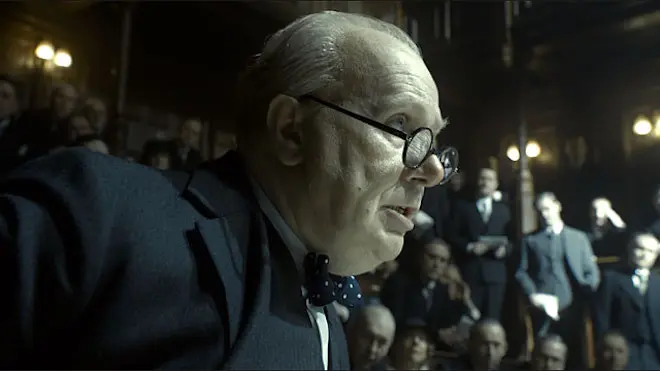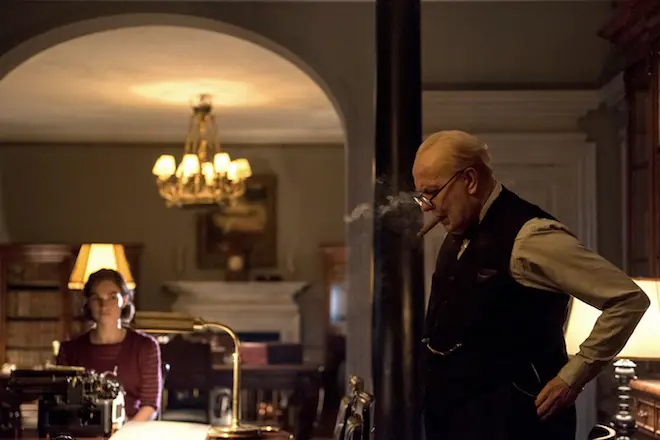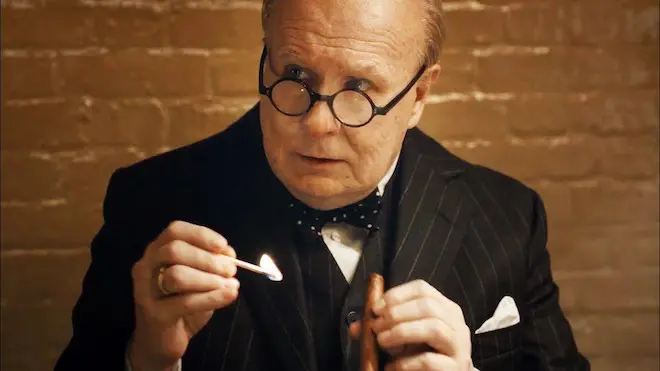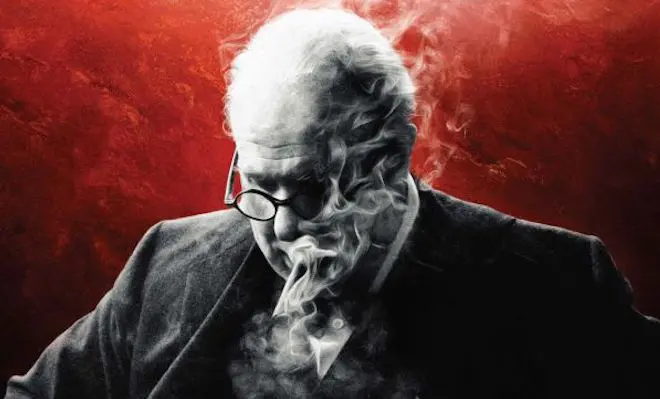It’s easy to begin any discussion about Joe Wright’s new movie, Darkest Hour, by discussing its star, Gary Oldman. The only problem is Gary Oldman is nowhere to be seen in this film. The wonderful actor completely dissolves into the role of Winston Churchill, and in so doing turns in one of the very best performances of the year and one of his best in his long and storied career.
Darkest Hour tells the story of Winston Churchill’s rise to power as Prime Minister of Great Britain in the infancy of World War II and his handling of the war efforts to protect the island nation from its enemies. Hitler’s forces, arguably the greatest army this world has ever seen, are taking huge chunks of Europe with ease, and Neville Chamberlain’s (Ronald Pickup) previous policy of appeasement has failed to rein in the leader of the Nazis. This leads to Chamberlain’s resignation as prime minister. Viscount Halifax (Stephen Dillane) refuses to take the seat and a backroom deal is made with King George VI (Ben Mendelsohn) to allow the pompous, blustery Churchill to take the seat of real power. Soon, those who made the deals realize that they were getting more than they bargained for, as Churchill leads the United Kingdom through arguably its darkest time.
Director Joe Wright (Atonement, Hannah, Pan) does a wonderful job telling this chapter of British history. In fact, Darkest Hour works well as a companion piece to Christopher Nolan’s sublime Dunkirk, as the two events are happening simultaneously and each film touches upon the actions in the other. Wright’s use of exotic camera angles and artistic transitions elevate the film from a stale war story to a film worthy of the drama onscreen. The script by Anthony McCarten moves at a steady pace, but still pauses long enough for Churchill to have his speeches, and there are plenty of speeches in this film. This is to be expected, as Churchill’s oration and use of language was one of his strongest features, and any movie about him or his life that doesn’t have long speeches is not doing the man justice. Darkest Hour represents Winston Churchill as a human being, and not some character from a history book. This is a film that will be shown in history classes going forward, and that is a testament to the production as a whole.
Joining Oldman’s masterclass in acting are Kristin Scott Thomas as Churchill’s wife, Clementine, and Lily James as his personal secretary, Elizabeth Layton. Each actor works to support Oldman, who is the center of Darkest Hour’s universe, and like the sun, each character revolves around him. Oldman has been turning in incredible performances his entire career, but I’ve never seen him become someone else quite like the role in this film. Under prosthetics and a fat suit, even his eyes convey a different persona, and for two hours, I didn’t see the esteemed actor at all, only Winston Churchill, brought back to life almost a century after his death.
Every year, there’s one performance by an actor or actress that is far and away better than their peers, and this year, it is Gary Oldman’s Winston Churchill.
Darkest Hour is a wonderful character study of a man tasked with saving a kingdom from certain annihilation. Gary Oldman redefines what acting is with his performance, and Joe Wright accommodates him with a supporting cast worthy of his skills. This is the story of a continent torn apart by the fires of war, and the flames burned hotter each day as Belgium fell, and France retreated. Churchill’s resolve and perseverance in the face of calamity is why we still talk about him today, and Darkest Hour is a wonderful example of what he meant to not only Great Britain, but to the Allies and the greater war effort in stopping Hitler and his Nazis from conquering the world.
Darkest Hour is rated PG-13 and is in limited release. It opens wide on December 22.






